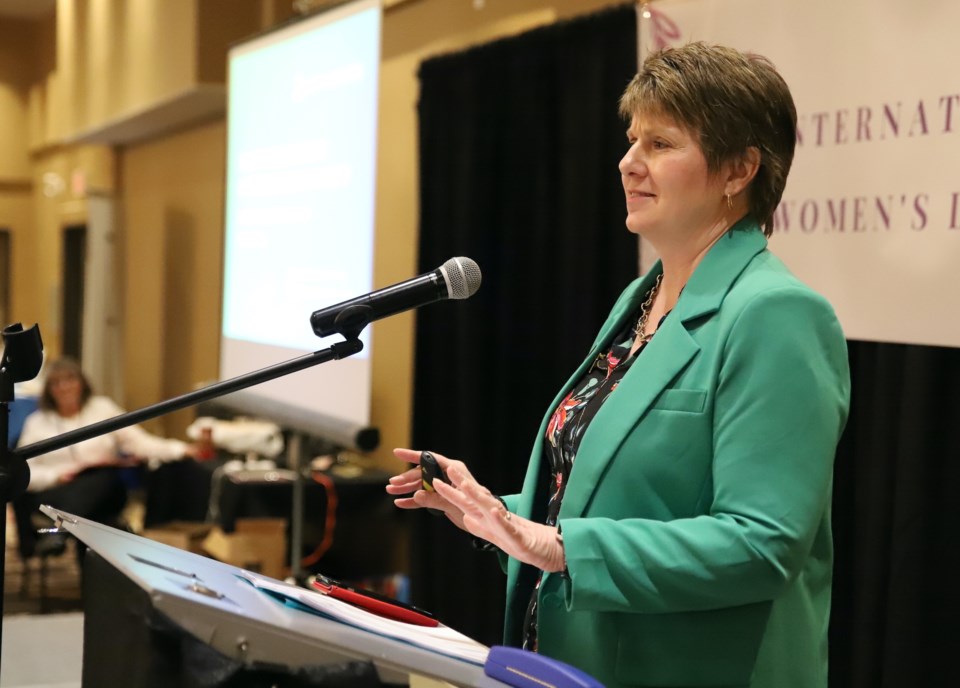OLDS — Nuclear power is a good option to generate clean energy in Alberta but there’s not enough support for it yet, so women are encouraged to get involved, said the keynote speaker at a recent event in Olds.
Vanessa White, executive director of clean technology, clean resources for Alberta Innovates, spoke during the Mountain View & Neighbours Women in Business awards luncheon, held March 8 at the Pomeroy Inn & Suites.
“We want to create a safe space where industry players can talk about, learn about nuclear without some of that potential reputational or financial risk of saying they're looking at nuclear before the public is ready to hear that collaboration around public perceptions,” White said.
White said according to a recent survey undertaken by the Angus Reid opinion research firm, 43 per cent of women in Alberta were supportive of nuclear power and 38 per cent were not.
The survey also found that 70 per cent of men between 18 and 25 were supportive of that form of power. However, she said among men older than that age group, support for nuclear power fell to “the mid 60s.”
“So why is there that deviation? And how are we going to fix it,” White asked.
“We're going to fix it by bringing Women In Nuclear to Alberta (WiN, a group that advocates for the use of nuclear and radiation technologies in Canada)."
White said a WiN chapter has been established in Alberta and she is the chair of that group.
“We are looking for women -- and men too -- that are interested in bringing nuclear to Alberta being part of our community. And membership is free,” she said.
“We have a lot of great programs that we offer. And one of the biggest things that we do is women talking to women about nuclear.”
White said a goal of the clean technology team is to diversify the province’s energy portfolio, blending “a traditional energy source with new clean, renewable energy sources.”
“How do we actually create that diversity in our portfolio where we apply the right technology in the right place at the right time?” she asked.
White said that’s what has led the team to look at small modular (nuclear) reactors (SMRs).
Alberta researchers and officials have been working in collaboration with federal counterparts to hammer out an appropriate SMR plan for the country.
White said Alberta is one of the only provinces that has “critical mass” in all three streams that were defined.
It has an opportunity to add nuclear energy to its existing energy grid.
It can take advantage of new generation, advanced reactors that produce far higher temperatures and pressures.
“These technologies will allow us to decarbonize the oil sands and some of other heat intensive industries like petrochemicals, refining, that sort of thing,” she said.
Micro reactors are another opportunity.
White said they could provide power to communities that currently rely on diesel or other power or want to use those reactors to develop their own independent energy source and diversify their economy.
During an interview with the Albertan, it was noted that nuclear reactors create waste which remains radioactive for thousands of years. White was asked what the plan is for dealing with that.
She said an Alberta nuclear consortium is working with several national groups to “try to figure that out.”
White noted that efforts are underway to store that waste in a “deep geological repository, which would store it very far underground, where it can be protected.”
“Their evaluation on that is that they will need it to be safe and secure for 150,000 years. And so that would be something that we in Alberta would be a part of,” White said.
However, White said that’s for long-term storage.
She said efforts are underway to determine the best way to deal with short-term storage of spent fuel.
Work is also being done to ensure those facilities are secure from those who may want access for nefarious purposes.
White said people don’t realize how little nuclear fuel is needed to produce a lifetime of power.
She cited a statistic promoted by the Canadian Nuclear Association.
On its site it says “the used nuclear fuel from one person’s entire lifetime of electricity in their home would fit inside a single soda can.”
White began her career about 20 years ago in the oil and gas industry.
During her speech, she said the clean technology team at Alberta Innovates is working on all kinds of ways besides nuclear to decarbonize the economy, particularly the oil and gas sector.
She cited carbon capture and storage and hydrogen as two examples, noting Alberta has a “hydrogen ecosystem” and a Hydrogen Centre of Excellence.
Natural gas is another advantage.
“We have a large amount of natural gas,” White said. “As we look at the electrification of everything, natural gas is something that we have an abundance of, and we need to find another use for it.”
White also pointed out that Alberta has lithium, which is currently in high demand as a key component of batteries for electric vehicles, cellphones, etc.
Due to that market, there’s a strong and growing lithium extraction and refining industry in Alberta.
White said her team is currently working on ways to make Alberta a hub for that industry and serve as a hub for battery recycling.
White said Alberta Innovates is also working with post-secondary institutions to take advantage of artificial intelligence to make health care, agriculture, water treatment and transportation more efficient.
She said the entrepreneurial investments team is working hard to support entrepreneurs in the province.
White noted that the provincial government has earmarked $35 million over three years to help with things like education, access to capital, mentorship and networking opportunities.



